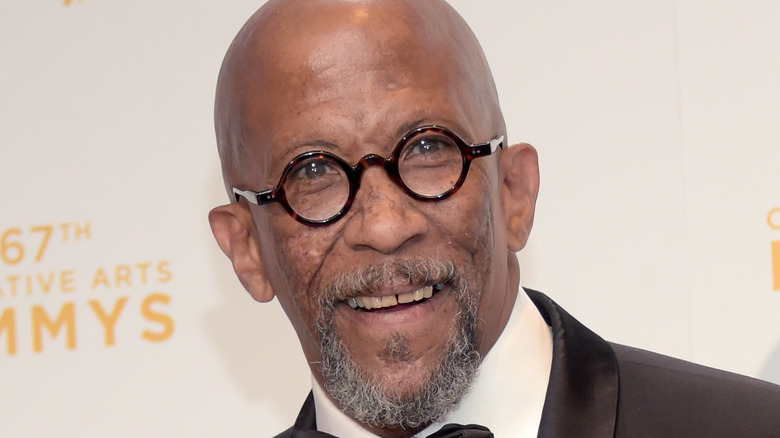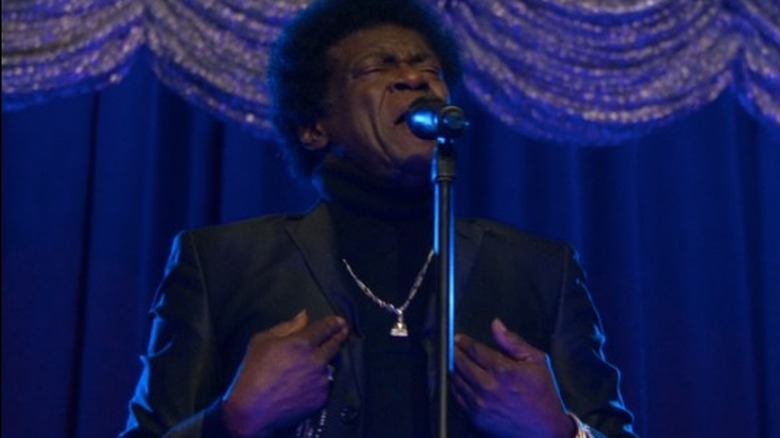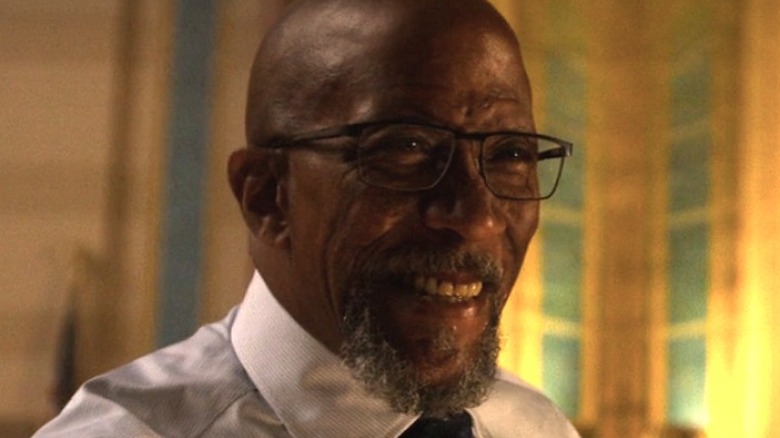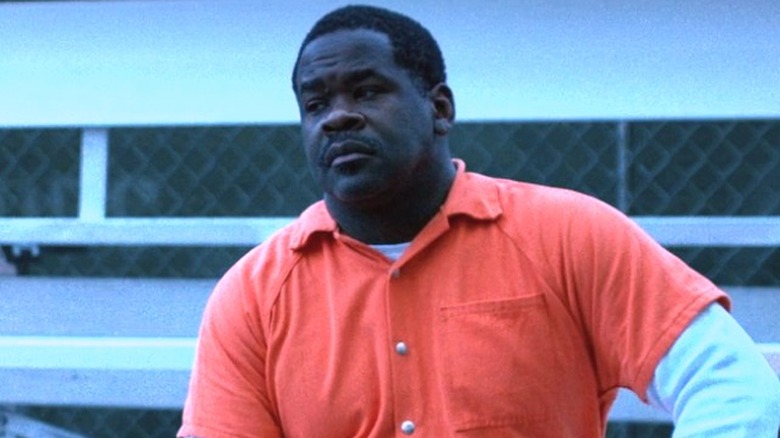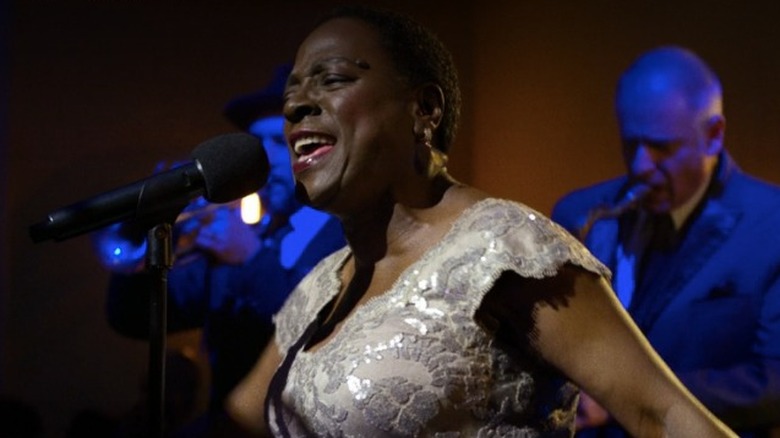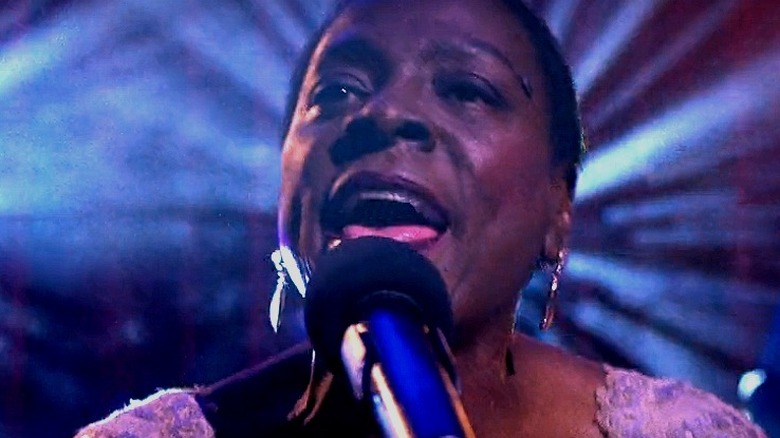Luke Cage Actors You Might Not Know Passed Away
One needn't have an encyclopedic knowledge of the ever-expanding Marvel Cinematic Universe to have seen and appreciated the pre-Disney+ Marvel series, "Luke Cage." The series' titular superhuman, portrayed by "Evil" star Mike Colter, first appeared in "Jessica Jones" (starring the inimitable Krysten Rytter) and went on to lead Netflix's third foray into the Marvel world beginning in 2016. Sadly, "Luke Cage" lasted just two seasons, a fate What's on Netflix's Jacob Robinson would later attribute to the fallout of the Netflix and Disney relationship, particularly once Disney made it clear they were pushing into the streaming realm with their own platform. That streaming service in question, which would become known as Disney+, now hosts both seasons of the series in its (blessedly) un-edited form.
"Luke Cage" was a refreshing and important addition to the Marvel universe. As The Establishment notes, the series "features a Black superhero, Black female supporting characters, and a Black creator, Cheo Hodari Coker, as well as the historically rich backdrop of Harlem, New York. In a landscape rife with white male heroes, in capes or otherwise, it's revelatory." This focus on relevant representation extended to the series' casting of both guest and recurring actors, including a number of artists whose legacy and impact in a variety of fields was established well before — and extends far, far beyond — their time on the show.
Not everyone who appeared on "Luke Cage," though, is still alive today, and that includes some of the legendary artists who performed in Harlem's Paradise.
Soul singer Charles Bradley starred in Season 1
In the third episode of its inaugural season — titled "Who's Gonna Take the Weight?" — "Luke Cage" tapped acclaimed soul singer Charles Bradley to perform two songs in the series' integral night club, Harlem's Paradise. His memorable rendition of his own "Aint It A Sin," not to mention his heart-wrenching cover of Black Sabbath's "Changes" would be his first and final live-action performance in a TV series (via IMDb). The episode aired in September of 2016, the same year the then 67-year-old singer was diagnosed with stomach cancer. Tragically, Bradley died of the disease in late September of the following year (via NBC News).
As Rolling Stone reports, the Gainesville, Florida native, long-time Brooklyn resident — and former James Brown impersonator — found success quite late in his career, releasing his first album, 2011's "No Time for Dreaming," at the age of 62. The outlet reveals that the artist's long road to success was filled with tragedy and adversity, experiences that come through in his music and lyrics, and which the singer talks about at-length in the 2012 documentary, "Charles Bradley: Soul of America."
Gabriel Roth aka Bosco Mann, composer and co-founder of Bradley's record label, said of his friend and collaborator that, "[Bradley's] soulful moans and screams will echo forever on records and in the ears and hearts of those who were fortunate enough to share time with him," adding "[Charles] wanted to hug each person on this planet individually [...] and anyone that ever saw him knows that he honestly tried" (via Rolling Stone).
Emmy winner Reg E. Cathey played Cage's father
Reg E. Cathey was already an acclaimed film and television star (via IMDb) when he took on the role of Pastor James Lucas, Cage's estranged father. While the character's impact on his son's life played a big role in the first season's narrative, Cathey did not actually make his series debut until the "Luke Cage" Season 2 premiere, and he went on to appear in seven more episodes — plus giving an uncredited voice-over in Episode 13, "They Reminisce Over You."
Cathey's career spanned nearly four decades, and included prominent or recurring roles in series such as (in addition to the aforementioned) HBO's "The Corner," "The Wire," and "Oz," Cinemax's "Outcast," Netflix's "House of Cards," and NBC's "Law & Order: Special Victims Unit." Cathey also starred in numerous films and TV movies, including 2004's "Everyday People," 2014's "St. Vincent" and 2017's critically-acclaimed adaptation of "The Immortal Life of Henrietta Lacks" (via IMDb). Notably, Cathey's first Marvel appearance occurred three years prior to his joining "Luke Cage," as in 2015, the actor portrayed Dr. Franklin Storm (father of Sue and Johnny) in the non-MCU movie "Fantastic Four."
Just months before his episodes first aired in 2018, Cathey died at the age of 59 (via Variety). Though his cause of death was not initially reported by TMZ when the outlet broke the news, it was later confirmed that the actor died of cancer (via New York Times). Cathey was thrice Emmy-nominated for his portrayal of Freddy Hayes on "House of Cards," taking home the award in 2015. Following his death, "The Wire" creator David Simon described Cathey as "a fine, masterful actor... [and] one of the most delightful human beings with whom I ever shared some long days on set" (via Twitter).
Craig muMs Grant shed light on Cage's past
In a series of Season 1, Episode 4 flashbacks, actor Craig muMs Grant portrayed a character in Cage's backstory. In "Step in the Arena," the series protagonist recalls the conspiracy and subsequent unjust imprisonment that ultimately led to his superhuman strength. While in prison, Cage meets and reluctantly gets to know Grant's character, a fellow inmate who goes by the nickname Squabbles.
Prior to joining the series, Grant, like his "Luke Cage" co-star Cathey, starred in both Jim McKay's "Everyday People" and Tom Fontana's "Oz." Grant's acting career kicked-off in 1999, and saw the actor appear in a litany of primetime series, including "Boston Legal," "Blue Bloods," "Cold Case," "NCIS: New Orleans," and three different "Law & Order" franchise series. Grant also enjoyed a recurring role in Spike Lee's movie spin-off series "She's Gotta Have It," Christian Keyes' "All The Queen's Men," and Rebecca Perry Cutter's STARZ series, "Hightown." On the big screen, Grant was best-known for his roles in 2005's "Black Water," 2013's "Side Effects," and 2017's critically-acclaimed "Good Time" (via IMDb), starring Robert Pattinson. Both preceding and following his success as an actor, Grant went by and was often credited under his slam poetry and stage name "muMs."
muMs died in March of 2021 due to complications resulting from diabetes, as his manager Sekka Scher confirmed at the time of his death (via The New York Times). The actor, rapper, playwright, emcee, and poet, whose career and legacy were honored and discussed at-length in a virtual memorial (via YouTube), was just 52 years old.
Sharon Jones brought the Season 1 finale to a new level
In the "Luke Cage" Season 1 finale, the actor, composer, and soul and funk singer Sharon Jones performed at Harlem's Paradise nightclub. In the episode, titled "You Know My Steez," Jones delivers a powerful rendition of Sharon Jones and the Dap-Kings' "100 Days, 100 Nights" to cap-off and punctuate the emotional and tumultuous first season.
Jones' first acting credit came in 2007 with a role in Denzel Washington's critically acclaimed "The Great Debaters" (via IMDb), and in 2013, the artist appeared in both Peter McGennis's "Queen City" and Martin Scorsese's Oscar-nominated "The Wolf of Wall Street." Not unlike Bradley, Jones didn't receive the public recognition she'd long deserved until the later end of her career, when, as Rolling Stones' Jason Newman wrote that, "In venues filled with people half her age, Jones was the most dynamic person in the room." Over the course of her career, the artist would appear on over 60 soundtracks, and in 2015, Jones and her longtime band the Dap-Kings, along with composer Bosco Mann, received a Grammy nomination in 2015 (per Billboard) for the album "Give the People What They Want."
Jones was diagnosed with pancreatic cancer in 2013, and in 2015 (on the cusp of the premiere of "Miss Sharon Jones!"), the artist announced that the disease, which had previously gone into remission, had returned (via Rolling Stone). Jones died in 2016 at the age of 60 in Cooperstown, New York, where she was, according to her publicist, "surrounded by members of her band, the Dap-Kings, and other loved ones when she died" (via the New York Times).
Luke Cage left an important legacy
The casting of each of these renowned artists in Netflix's "Luke Cage" was no accident. In Wired's "Modern Marvel: Why Luke Cage is the Superhero we Really Need Right Now," writer Jason Tanz revealed that Coker's attraction to the series was no accident, either. "Coker says he was inspired to serve as showrunner," Tanz writes, "when he realized the ramifications of a series about a black man with impenetrable skin and how that might empower him to take on both criminals and crooked authority figures."
Despite the unjustly short lifespan of "Luke Cage" — which, to make matters worse, was cancelled after a cliffhanger finale at the end of Season 2 –the series was an important narrative installment for Marvel, and one whose commitment to casting Black leads, writers, and even guest stars was not lost on its audience, nor its lead.
Speaking to Wired, Coker noted that part of what made the series so significant was that, in his words, "The main reason people don't speak out [against said criminals and crooked authority figures], their main fear, is getting shot. So what happens if someone is bulletproof? [...] That changes the whole ecosystem." The series, likewise, made an admirable attempt to change the then-homogenous ecosystem of the MCU, and is remembered fondly for it.
